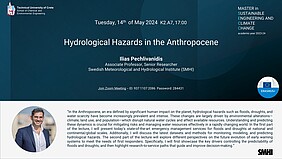Ανοικτή Ερευνητική Διάλεξη: Ilias Pechlivanidis, « Hydrological Hazards in the Anthropocene» | 14-05-2024, 17:00, Αίθ. Κ2.Α7 & zoom, στο πλαίσιο του προγράμματος κινητικότητας του Erasmus+
Η έκτη στη σειρά Ανοικτών Ερευνητικών Διαλέξεων εαρινού εξαμήνου Ακαδ. έτους 2023-24 στο πλαίσιο του Προγράμματος Μεταπτυχιακών Σπουδών "Sustainable Engineering and Climate Change" θα πραγματοποιηθεί την Τρίτη 14 Μαΐου και ώρα 17:00 στην αίθουσα Κ2.Α7 και διαδικτυακά μέσω zoom (βλ. παρακάτω).
Παρακολουθήσετε τον Αναπλ. Καθηγητή και Επικεφαλής Ερευνητή κ. Ηλία Πεχλιβανίδη, Swedish Meteorological and Hydrological Institute (SMHI), στη διάλεξη με τίτλο «Hydrological Hazards in the Anthropocene».
Join Zoom Meeting:
https://tuc-gr.zoom.us/j/93655736510?pwd=TWJuRldTeWVMVnRUNWZXZm9JWjBVQT09
Meeting ID: 936 5573 6510
Password: 819740
Ilias Pechlivanidis
Ilias Pechlivanidis is an Associate Professor and Senior Researcher in hydrology and water resources at SMHI and the Project Manager of the Analytics and Dissemination Centre for the Copernicus Emergency Management Service - Floods. He is a Member of the WMO Research Board, Expert Member Hydrology of the EUMETSAT, the Co-Chair of the Hydrologic Ensemble Prediction Experiment (HEPEX) scientific initiative, a Reference Member at the Centre of Natural Hazards and Disaster Science (CNDS), and the first Earth Observation Evangelist for the agriculture sector of the FIRE forum. During 2021-2024, he was the chair of the EGU Hydrological Forecasting sub-division. His scientific achievements focus on hydrometeorological forecasting, environmental change impacts, science communication, cross-cutting applications of earth observations, early warning and user-tailored water and climate services. He has been leading tasks in co-creating operational early warning systems and hydro-climate services over Europe and the globe.
Hydrological Hazards in the Anthropocene
In the Anthropocene, an era defined by significant human impact on the planet, hydrological hazards such as floods, droughts, and water scarcity have become increasingly prevalent and intense. These changes are largely driven by environmental alterations—climate, land use, and population—which disrupt natural water cycles and affect available resources. Understanding and predicting these dynamics is crucial for mitigating risks and managing water resources effectively in a rapidly changing world. In the first part of the lecture, I will present today’s state-of-the-art emergency management services for floods and droughts at national and continental/global scales. Additionally, I will discuss the latest datasets and methods for monitoring, modeling, and predicting hydrological hazards. The second part of the lecture will explore different perspectives on the future evolution of early warning systems to meet the needs of first responders. Specifically, I will first showcase the key drivers controlling the predictability of floods and droughts, and then highlight research-to-service paths that guide and improve decision-making.


